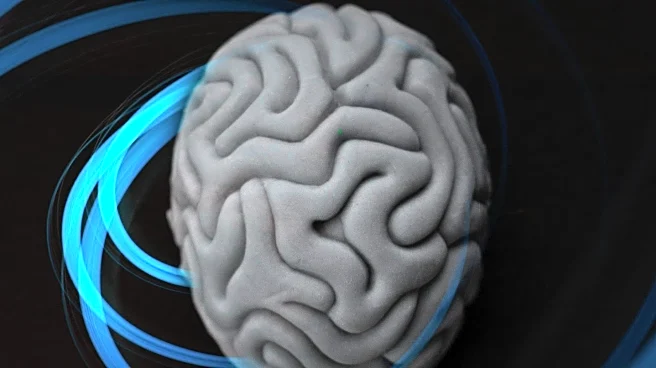What's Happening?
In a groundbreaking development, researchers are exploring a novel pill that may enable the brain to heal itself after strokes or traumatic injuries. This pill activates dormant genes responsible for neurogenesis, allowing the formation of new brain cells. Clinical trials are underway to assess its effectiveness in restoring cognitive and motor functions in stroke patients. The pill, which repurposes existing medications like Maraviroc, has shown promise in animal models, demonstrating the ability to repair damaged neural circuits. If successful, this innovation could revolutionize treatment strategies for neurological disorders, reducing reliance on intensive rehabilitation.
Why It's Important?
The potential for a pill to facilitate brain self-repair represents a significant shift in neurological treatment, offering hope to millions affected by strokes and traumatic brain injuries. Current rehabilitation methods are costly and often yield limited results, so a successful pill could reduce healthcare expenses and improve patient outcomes. The pharmaceutical industry sees this as an opportunity for market expansion into neurodegenerative conditions like Alzheimer's disease. However, ethical considerations and safety protocols are crucial, as regulatory bodies closely monitor these advancements to prevent unforeseen risks.
What's Next?
As clinical trials progress, researchers will focus on monitoring side effects and evaluating brain plasticity in stroke survivors. Collaboration between academic institutions and biotech companies is intensifying, aiming to combine mechanical and chemical methods for optimal patient outcomes. If the pill proves effective, it could transform recovery processes, prompting a shift in investment towards neurotherapeutics. Comprehensive results are anticipated in the coming years, determining the real impact of this approach on brain health and potentially paving the way for new treatments for various neurological conditions.
Beyond the Headlines
The development of this pill raises ethical questions about balancing innovation with safety. Regulatory bodies must ensure that new therapies do not lead to complications like seizures due to excessive neural activity. The research also highlights the importance of personalized medicine, as individual responses to treatment can vary widely. This innovation could lead to a paradigm shift in how neurological disorders are treated, emphasizing the need for continued research and collaboration to address the complexities of brain health.









